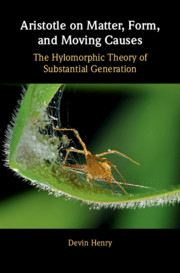Book contents
- Aristotle on Matter, Form, and Moving Causes
- Aristotle on Matter, Form, and Moving Causes
- Copyright page
- Dedication
- Contents
- Preface and Acknowledgements
- Abbreviations of Aristotle’s Works
- Introduction
- Chapter 1 Preliminary Puzzles
- Chapter 2 The Hylomorphic Model of Substantial Generation: Physics I
- Chapter 3 Substantial versus Non-Substantial Change: GC I 1–4
- Chapter 4 The Extended Hylomorphic Model: GC II 9
- Chapter 5 Biological Generation: Part One
- Chapter 6 Biological Generation: Part Two
- Chapter 7 The Efficient Cause of Animal Generation
- Chapter 8 The Architectonic Model
- Chapter 9 The Cosmological Significance of Substantial Generation
- Bibliography
- Index Locorum
- Subject Index
Chapter 7 - The Efficient Cause of Animal Generation
Published online by Cambridge University Press: 14 November 2019
- Aristotle on Matter, Form, and Moving Causes
- Aristotle on Matter, Form, and Moving Causes
- Copyright page
- Dedication
- Contents
- Preface and Acknowledgements
- Abbreviations of Aristotle’s Works
- Introduction
- Chapter 1 Preliminary Puzzles
- Chapter 2 The Hylomorphic Model of Substantial Generation: Physics I
- Chapter 3 Substantial versus Non-Substantial Change: GC I 1–4
- Chapter 4 The Extended Hylomorphic Model: GC II 9
- Chapter 5 Biological Generation: Part One
- Chapter 6 Biological Generation: Part Two
- Chapter 7 The Efficient Cause of Animal Generation
- Chapter 8 The Architectonic Model
- Chapter 9 The Cosmological Significance of Substantial Generation
- Bibliography
- Index Locorum
- Subject Index
Summary
As we have seen, Aristotle opens the Generation of Animals by announcing that he has already dealt with three of the four causes of animals and their parts (formal, final, and material) and that it remains to discuss the efficient cause. For ‘to inquire into this and to inquire into the manner of generation for each thing is, in a way, the same thing’ (GA I 1, 715a1–18). But here we immediately encounter a puzzle. On the one hand, the GA routinely identifies the male principle as the primary efficient cause of the animal and its parts, which is housed in another individual of the same species, namely the father. This would suggest that generation has an external efficient cause (external to the thing that comes to be from it).
- Type
- Chapter
- Information
- Aristotle on Matter, Form, and Moving CausesThe Hylomorphic Theory of Substantial Generation, pp. 143 - 161Publisher: Cambridge University PressPrint publication year: 2019

